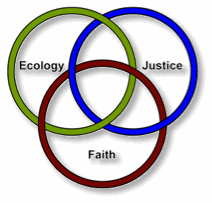ECO-JUSTICE ETHICS: A Brief Overview
Ecological responsibility in linkage with social justice is what the world needs now. Healthy earth community requires advocacy and action on urgent environmental issues in ways that connect with struggles for social and economic justice. “Eco-justice” envisions and values both ecology and justice, since there will be little achievement of environmental health without movement toward socio-economic justice, and vice versa. (Some discussions of “sustainability,” a prominent concept in environmental studies and political discourse, have parallel ethical meaning, to the extent that they also encompass social justice principles (See Cobb, 1992).
Today, there is growing appreciation for and “construction of what is often called an ‘eco-justice’ ethic…that holds together concerns for the natural world and for human life, that recognizes that devastation of the environment and economic injustice go hand in hand, and that affirms that environmental and human rights are indivisible” (Pedersen, 1998). The vision and values of eco-justice ethics express a spiritually grounded moral posture of respect and fairness toward all creation, human and nonhuman. E-J ethics are shaped by religious insight and scientific knowledge, interwoven with social, economic and political experience.
Read more (.pdf)
Exploring Basic Norms of Eco-Justice Ethics
The task of ethics is to reflect critically and constructively on the why and what of moral action within a common ethos and in communities of shared interpretation. Social ethics engages plural communities of interpretation in reflecting on the moral significance of human action for justice, sustainability, compassion, and peace. Such ethical reflection, when done well, articulates a transformative vision, guiding moral norms, and supporting principles to shape decision-making, but it presents no simple choices. Melding passion of soul, personal-social purpose, and practical good sense, ethical reflection enables participants to “read” situations truthfully, to critically examine complementary and clashing moral claims that underlie policies and practices, and to evaluate probable results of particular decisions – all with the intention of overcoming eco-social injustice.
Our focus: Eco-justice ethics makes an important contribution to prophetic environmentalism by articulating basic norms and supporting principles for morally coherent earth citizenship. Toward that end, this piece will concentrate on “unpacking” the substance of the four basic, interrelated eco-justice norms – solidarity, sustainability, sufficiency, and participation – that were introduced in the Brief Overview. These norms embody a vision and guide a praxis that first emerged in the 1970s and that becomes ever more relevant in our time.
Read more (.pdf)
Environmental Racism and Environmental Justice:
Moral Theory in the Making?
by Larry RasmussenThis essay shows how the environmental justice movement challenges and should reshape environmental ethics generally and Christian moral theory in particular. The essay discusses three topics:
- the collective and systemic nature of environmental racism and injustice,
- needed emphases in presenting the eco-crisis narrative, and
- environmental justice as social transformation over against cramped ethical theories of justice.
The E-J Movement demands both participatory and distributive justice that seeks the well-being of the whole community of life in each locale threatened by pollution and inequality. It pushes doers of Christian ethics to expand the boundaries of moral community to give standing to all creation in, with and before God while embracing full membership in the human family of people who otherwise are being ignored or overpowered. and to join in liberative action.
Read more (.pdf)
Saving Creation: Faith Shaping Environmental Policy
by Holmes Rolston IIIReligious faith can make a unique contribution to environmental policy. Scientific reasoning is able to offer only partial and value free guidance. Religious communities can offer precisely what science lacks: a value-laden, unified understanding of creation, humankind, and our obligations as stewards of Earth…Faith-oriented environmental advocates have comprehensive world views, a strong sense of environmental justice in the face of the increasingly inequitable distribution of wealth, spiritual motivations for living with limits, and a sense of caring for a sacred earth.
Read more (.pdf)
Focusing on Sustainability
Integrated Earth Charter Ethics: Two Approaches
The Earth Charter articulates an inspiring vision, as well as basic values, and essential ethical principles for healthy earth community. Its commonly shared eco-justice imperatives for the 21st century are applicable everywhere at all three levels of moral agency—personal, institutional, and governmental. In the words of the drafting committee chair, “The objective is to give to the emerging global consciousness the spiritual depth—the soul—needed to build a just and peaceful world community and to protect the integrity of Earth’s ecological systems” (Rockefeller, 2001). The Charter’s concluding sentence anticipates our participation in “the awakening of a new reverence for life, the firm resolve to achieve sustainability, the quickening of the struggle for justice and peace, and the joyful celebration of life” (Earth Charter 2000, Conclusion).
The Earth Charter’s holistic, layered principles present a moral ecology of crucial values to observe and necessary methods to follow in seeking truly sustainable development/community. They also provide an ethical standard for evaluating policies or practices that purport to build a sustainable, just, participatory, and peaceful world. Besides showing what sustainable living is all about—individually, institutionally, and collectively—the interactive imperatives stated in the Charter offer a coherent standard for evaluating global/local issues, business and professional codes of conduct, and plans to reform corporate or community habits.
Read more (.pdf)
Religion and Ethics Focused on Sustainability
The concept of sustainability resonates with many world religious traditions . Religious environmental activists emphasize a responsibility to conserve resources, protect biodiversity, and respect all beings, both human and nonhuman. To further these values, faith communities in the United States should teach eco-justice ethics informed by insights from natural sciences and rooted in sacred religious texts, continue to emphasize energy saving initiatives that are expected of all who claim to care for creation, advocate for environmentally responsible public policies, and nurture members through the difficulties of the eco-justice journey.
Read more (.pdf)
